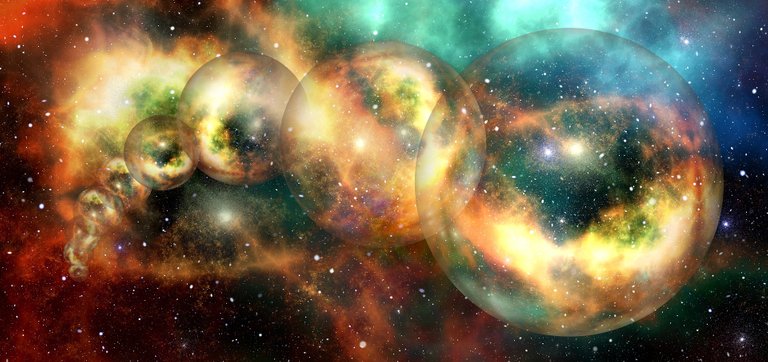Is Dark Matter Coming From The Multiverse?
If the multiverse exists, then a tiny young Universe must get sometimes created in it. And these may sometimes collapse into a black hole or something that appears as black holes to us. Such primordial black holes could be the solution to what dark matter is.

Image by Gerd Altmann from Pixabay
- Be also sure to check out my other posts and follow me @kralizec and subscribe to my Youtube channel at Kralizec Gaming Youtube Channel
Where does dark matter come from? One of the incredible options is that it’s hiding in primordial black holes that were created when the Universe was just a child. And perhaps all or just some part of dark matter could be in them. The primordial black holes could also be responsible for some gravitational waves and could also be ancient fetuses of the supermassive black holes we see at the centers of galaxies.
Yet, primordial black holes are more of a phantom than anything we know exists for sure. But there’s still a chance. Many processes took place when the Universe was young that could have created them. Now, the question is whether any of these processes actually created them.
Alexander Kusenko from the Kavli Institute for the Physics and Mathematics of the Universe (PMU) in Japan and his colleagues are now proposing a new amazing possibility that primordial black holes could be born from baby universes created in the multiverse.
They started with the idea that a multiverse exists. Then they assumed that baby universes are being created in it. These should then go through a phase of cosmological inflation during which they separate from our Universe. And sometimes, these baby universes can collapse on themselves creating a lot of energy that could result in a black hole.
And that’s not all. If the baby universe manages to grow over a certain limit it should be even stranger. To an observer that would be inside the baby universe everything would appear as a normal expanding universe. But to an outside observer, it would appear as a black hole. In both the small and large baby universe these would be primordial black holes that would literally hide the secrets of the universe(s) behind their event horizons.
Kusenko and his team didn’t stop with just proposing the existence of baby universes. They also came up with an interesting way to discover them.
Primordial black holes have the same exact problem as regular black holes. If they aren’t feeding on matter, they aren’t really visible. Yet, the key to discovering them should be a powerful camera called Hyper Suprime-Cam (HSC) on the Subaru telescope which can be found in the Hawaiian observatory, Mauna Kea.
But why the HSC camera? It can take pictures of the whole Andromeda galaxy every few minutes. That makes it a unique source of data for finding gravitational lenses. If an invisible black hole would pass in front of a star in the Andromeda galaxy the star would temporarily become much brighter making the images taken by the HSC camera an ideal way to search for primordial black holes.
Actually, researchers have already detected the first candidate for such an event. If they really were lucky, then it is a primordial black hole born from the multiverse and it should have a mass equal to roughly the mass of our Moon. The scientists are now analyzing the data and hopefully, we will soon have an answer.
Sources:
- If you like the content I’m producing about science maybe you will like the content I produce about gaming as well! Be sure to check out my other posts!
Congratulations @kralizec! You have completed the following achievement on the Hive blockchain and have been rewarded with new badge(s) :
You can view your badges on your board and compare yourself to others in the Ranking
If you no longer want to receive notifications, reply to this comment with the word
STOPTo support your work, I also upvoted your post!
Do not miss the last post from @hivebuzz: